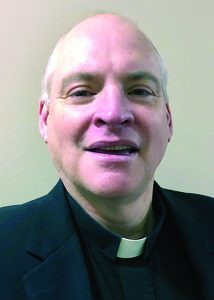The Comfort of the Communion of Saints

Rev. Robert Mohns
by Robert Mohns
A couple of years ago I had the great blessing of walking along the Napoleon route of the Camino Santiago de Compostela in the northern Iberian Peninsula of Spain. One day in a local church, I made the observation that I had sadly encountered so many local churches whose doors were barred and looked like they had been closed for many years. The local parishioner responded, “It is because of the Lutherans. They tore the church apart.” The tone was harsh and bitter, and took me aback.
In our little Synod, we too have experienced churches closing their doors. Many of our congregations have suffered significant loss of members. These losses and closures certainly bring to all of us a sense of grief and mourning. Perhaps we are tempted to give ourselves over to searching for someone or something to blame. This leads to an unhelpful and unhealthy misappropriated blame, conflict, and division.
It is true that the great treasure of the Holy Christian Church, the blessed Communion of the Saints in this world, is hidden to the world. But I pray that the Lord would open our eyes to the comfort and joy found in remembering the communion of saints. May we ever praise God for His work of calling and gathering His people into the Holy Christian Church in grace and hereafter into the Church triumphant.
It is true that the great treasure of the Holy Christian Church, the blessed Communion of the Saints in this world, is hidden to the world. But I pray that the Lord would open our eyes to the comfort and joy found in remembering the communion of saints.
Recently I was reminded of one of Luther’s early devotional writings. Luther, at the urging of his mentor, Spalatin, wrote a letter to Frederick the Wise in 1519. The Elector of Saxony had just returned from the election of Charles of Spain as Emperor of the Holy Roman Empire, and appeared to have grown very ill upon his return home. Luther wrote a devotional letter entitled “Fourteen Consolations, for those who labor and are heavy-laden.” Due to its popularity and many falsified copies, Luther allowed the devotional work to be officially published.
By way of introduction, Luther writes: “The Holy Scriptures approach the matter of comfort in a twofold manner, insofar as they present to our view both blessings and evils, wholesomely intermingled.” Luther goes on to expound seven evils and seven blessings. (The whole devotional work is worth reading, by the way.) Writing on the sixth blessing, Luther turns his attention to the great treasure we have in the communion of the saints, the Christian Church, the Body of Christ:
Whose heart will not be lifted up, even in the midst of great evils, when he believes the very truth, namely, that the blessings of all the saints are his blessings, and his evil is also theirs? That is the very pleasant picture the Apostle paints in his word to the Galatians, “Bear one another’s burdens and so fulfil the law of Christ” [Galatians 6:2]. Is it not a blessing for us to be in a company where “if one member (as is said in 1 Corinthians 12 [:26]) suffers, all members suffer together, and if one member is honored, all members rejoice together?” Therefore, when I suffer, I do not suffer alone, but Christ and all Christians suffer with me, for Christ says, “He who touches you, touches the apple of my eye” [Zechariah 2:8]. Thus others bear my burden, and their strength is my strength. The faith of the church comes to the aid of my fearfulness; the chastity of others endures the temptation of my flesh; the fastings of others are my gain; the prayer of another pleads for me. In brief, such care do the members show one another that the more honorable members cover, serve, and honor the less respected members, as is so beautifully set forth in 1 Corinthians 12 [:22–26].
Christ does not want us to be alone on the road of death, from which all men shrink. Indeed, we set out upon the road of suffering and death accompanied by the entire church. Actually, the church bears it more bravely than we do. Thus we can truthfully apply to ourselves the words Elisha spoke to his fearful servants, “Fear not, for those who are with us are more numerous than those with them. And Elisha prayed and said, ‘Lord, open the eyes of the young man that he may see.’ And the Lord opened his eyes and he saw. And behold, the mountain was full of horses and chariots of fire around Elisha” [2 Kings 6:16–17].
All that remains for us now is to pray that our eyes, that is, the eyes of our faith, may be opened that we may see the church around us. Then there will be nothing for us to fear, as is also said in Psalm 125 [:2], “As mountains are round about it, so the Lord is round about his people, from this time forth and forever.” Amen.
Luther’s prayer is one that the saints of this and every age should take up: that the Lord would open our eyes of faith to the great gift He has given to us: the blessed communion of saints. And how much more fitting it is as the whole Christian Church celebrates the great festival of All Saints Day 2019!
———————
Rev. Robert Mohns is Regional Pastor of Lutheran Church–Canada’s West Region.



